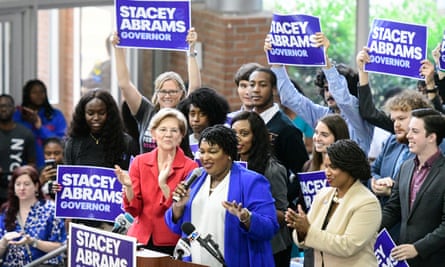With just over a month before the crucial midterm elections, Americans in some states will return to the polls two years after the election of Donald Trump to face new laws that could make it harder to vote.
Since a landmark supreme court ruling in 2013, which repealed key provisions of the 1965 Voting Rights Act, over a dozen states, mostly Republican controlled, have imposed a swathe of laws that critics argue are intended to suppress the franchise among often vulnerable, Democratic leaning, groups.
The measures range from complex voter ID laws to restrictive voter registration procedures as well as efforts to cut back on polling places and bids to exclude more former felons from casting a ballot.
By the 2016 presidential election 14 states had enacted voter suppression laws, according to the Brennan Centre for Justice, which also notes that in 2017 three other states – Arkansas, North Dakota and Missouri – also passed voting restriction laws.
Here are some of the important recent developments in the most critical midterm jurisdictions ahead of the election on 6 November.

North Dakota
Last week the supreme court allowed the state to keep a voter ID law in place that will likely bar thousands of Native Americans from voting in November. The law, brought in by state Republicans after Democrat Heidi Heitkamp won a tight US Senate race in 2012, requires voters to present identification that includes a current residential address.
It has been challenged by a collective of Native American voters who argue the law will disproportionately disenfranchise the state’s 30,000 American Indians many of who live on reservations without standard addresses.
The North Dakota Senate race, between Heitkamp and Republican Kevin Cramer, is one of the most pivotal battles in the Democrats’ bid to retake the US Senate. Heitkamp is already significantly behind, recent polls indicate, after she voted against Donald Trump’s supreme court nominee Brett Kavanaugh.

Georgia
It was revealed earlier in the month that the Georgia secretary of state, Brian Kemp, had held back at least 53,000 voter registration applications, the majority from African American voters, with just days before the state’s registration deadline.
Kemp is the Republican nominee for governor in one of the most closely watched gubernatorial elections in country. He is facing Democrat Stacey Abrams who could become America’s first black female governor if elected.
Last week Kemp was sued by a collective of civil rights groups who argue the state’s “exact match” laws, which require personal information on voter applications – such as driver’s license numbers to precisely match state databases, are simply a way of suppressing the vote.
This week, two lawsuits were filed after the state’s most diverse county rejected an unusually large share of absentee ballots.
Missouri
In another crucial Senate race Democratic incumbent Claire McCaskill is fighting to keep her seat in a state Donald Trump won by 18% in 2016.
Missouri is among those states to have introduced voter ID laws since the 2016 presidential elections, which are currently being challenged in court by democratic leaning advocacy groups.
Last week a senior state judge scolded Missouri’s Republican secretary of state for publishing misleading advertisements about the new law, which falsely suggested voters would need photo ID to cast their ballot, and blocked him from publishing any more. The ruling was a small victory for voting rights advocates who have challenged the law’s broader constitutionality.

Florida
In what could become one of the most significant votes in the history of this swing state, Floridians will also decide in November on whether to automatically restore the franchise to former felons.
Florida is one of just three states in the US that permanently disenfranchises ex-criminals and requires them to personally petition the government to get their rights restored. Over 1.5 million people in Florida have lost the franchise due to this law – by far the largest number of former felons to be disqualified in any state in America.
Polling last month indicated 71% of voters in Florida support the bid to amend the state constitution, with the referendum requiring 60% to pass.
Elsewhere:
In Ohio the bid to curtail the state’s aggressive voter purges – which require individuals who have not cast a ballot in two years to resubmit documentation to vote – was dealt another blow earlier in the month. Last week a federal judge ruled that elements of the process were constitutional. Earlier in the year, in a 5-4 ruling, the US supreme court had upheld other elements of the process.
In Arkansas, another state to introduce voter ID laws since Trump’s victory, the state’s supreme court reversed a lower court ruling, meaning the law would take effect for the first time during elections next month.
